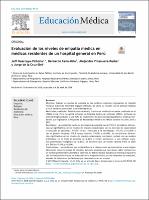| dc.contributor.author | Huarcaya Victoria, Jeff | |
| dc.contributor.author | Cano Uría, Bernardo | |
| dc.contributor.author | Villanueva Ruska, Alejandro | |
| dc.contributor.author | De la Cruz Oré, Jorge | |
| dc.date.accessioned | 2020-07-02T14:25:47Z | |
| dc.date.available | 2020-07-02T14:25:47Z | |
| dc.date.issued | 2018-04 | |
| dc.identifier.citation | Educación Médica. 2019; 20(2). | es_PE |
| dc.identifier.issn | 1575-1813 | |
| dc.identifier.uri | https://hdl.handle.net/20.500.12959/793 | |
| dc.description.abstract | Estudio observacional y transversal mediante encuesta realizado en el Hospital Guillermo Almenara en Lima, Perú, para evaluar el nivel de empatía de los médicos residentes ingresantes la hospital, así como su relación con la actitud religiosa y otras variables personales y sociodemográficas. Se aplicó la Escala de Empatía Médica de Jefferson, la Escala de Actitud Religiosa y una ficha de recolección de datos sociodemográficos a médicos residentes que ingresaron al Programa de Residentado Médicos durante 2016 y 2017. Los residentes que se identificaron como pertenecientes a una religión obtuvieron mayor nivel de empatía, así como aquellos que mencionaron haber contado con un modelo profesional en el trato con el paciente. | es_PE |
| dc.description.abstract | Objective
To evaluate the level of empathy in medical residents in the Hospital Nacional Guillermo Almenara Irigoyen (HNGAI), as well as its relationship with the religious attitude and other personal and sociodemographic variables.
Material and methods
Observational and cross-sectional study using a questionnaire conducted on the HNGAI, Lima, Peru. The Jefferson Medical Empathy Scale (EEMJ), the Religious Attitude Scale (EAR), and a sociodemographic data collection card were used to collect data from medical residents who entered the HNGAI medical residency program during the years 2016 and 2017.
Results
The mean score of empathy levels was 118.74. Non-significant differences were found in the levels of empathy related to the choice of specialty (‘people-oriented’: 119.58 versus ‘technology-oriented’: 117.15, P = .189); and gender (women: 119.5 versus males: 118.05, P = .408). Significant differences were found in the levels of empathy related to having had a professional model in treating the patient (P = .004) and referring to belonging to a religion (Catholic/Protestant/Evangelical) (P = .003). A direct correlation was found between the EEMJ and the EAR (r = .249, P = .006).
Conclusions
The residents who identify themselves as belonging to a religion obtained higher levels of empathy, along with those who mention having a professional model in the treatment of the patient. Prospective studies should be conducted in order to evaluate the evolution of medical empathy in medical residents. Determining the factors that would intervene in their erosion would also be useful. | |
| dc.format | application/pdf | es_PE |
| dc.language.iso | spa | es_PE |
| dc.publisher | Universidad Complutense de Madrid. Cátedra de Educación Médica | es_PE |
| dc.relation.uri | https://www.sciencedirect.com/science/article/pii/S1575181318301189?via%3Dihub | |
| dc.rights | info:eu-repo/semantics/openAccess | es_PE |
| dc.rights.uri | https://creativecommons.org/licenses/by/4.0/ | es_PE |
| dc.subject | Educación Médica | es_PE |
| dc.subject | Residentes de Medicina | es_PE |
| dc.subject | Empatía | es_PE |
| dc.subject | Religión | |
| dc.subject | Perú | |
| dc.subject | Religion | |
| dc.subject | Resident education | |
| dc.subject | Medical education | |
| dc.title | Evaluación de los niveles de empatía médica en médicos residentes de un hospital general en Perú | es_PE |
| dc.title.alternative | Evaluation of the levels of medical empathy in medical residents of a general hospital in Peru | |
| dc.type | info:eu-repo/semantics/article | es_PE |
| dc.subject.ocde | https://purl.org/pe-repo/ocde/ford#3.02.27 | es_PE |
| dc.subject.ocde | https://purl.org/pe-repo/ocde/ford#3.03.02 | es_PE |
| dc.publisher.country | PE | es_PE |
| dc.identifier.doi | https://doi.org/10.1016/j.edumed.2018.04.004 | |






